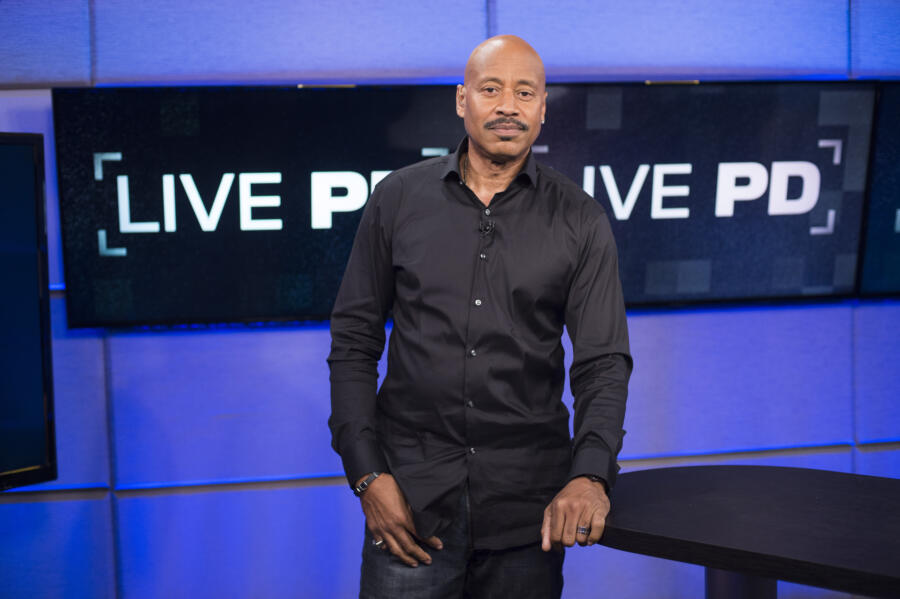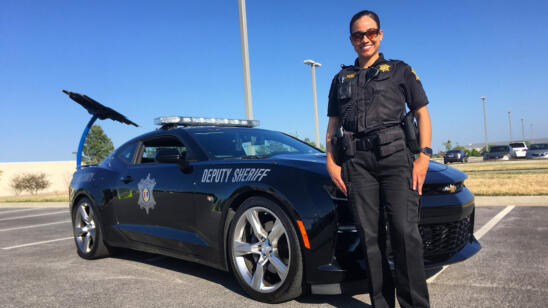In every episode of Live PD, analyst Tom Morris Jr.—along with host Dan Abrams and the rest of America—watch the good, the bad and the ugly of how cops and civilians interact. Most encounters go smoothly, but some do not. Since being approached by an officer can inspire feelings ranging from confusion to panic, we asked Morris for some tips on how best to behave—and communicate—during a brush with police.
If you are pulled over, what should you not do? What’s a red flag?
Definitely keep your hands on the steering wheel or up on the dashboard in plain sight —and keep them there—as the officer approaches the car. Put your window down as soon as you come to a stop, unless it’s snowing or raining, then you might want to keep it up until they come to the window). Don’t start getting your driver’s license out because he’s just pulled you over. Wait until he asks for your license, your registration or your insurance information, then follow what he or she requested.
When you’re pulled over for speeding, for example, it doesn’t hurt to ask an officer why he pulled you over. But it’s better to wait and see if they tell you first. Let’s say you were pulled over by police and you know you were speeding. When he comes up to the car and the first thing you say is, ‘Officer, I know I was speeding and here’s why…’—he might be more lenient because you admitted what you were doing. He already knows what you were doing; he knows why he stopped you. It’s not going to incriminate you any more than you already are. A lot of times, if it’s a speeding stop [and you say], ‘Officer, I know my headlights are out. I just found out today when I got in the car and I’m going to get them fixed!’—you can pre-empt a ticket sometimes just by being forthcoming.
But do you have to have a good excuse, like ‘My wife is in labor,’ not that you were speeding because you were hungry and wanted to get to the nearest drive-thru?
The only thing that should come out of your mouth is an answer to a question the police officer asked you, or the truth that you offer up. And it better be the truth, because if you’re lying, be aware that police officers have seen and heard it all. If you’re a cop out on the street, you’re dealing with people all day long and you build up a lot of psychological knowledge. You see through a lot of the nonsense people try to pull over on you.
What are some things people have done on Live PD where you thought, ‘That is not a good idea’?
A couple of weeks ago, a female officer pulled over a guy whose tags and insurance were suspended. He said the car had just been returned to him after being stolen. He had just picked it up from the impound lot. The first mistake he made was that, when she pulled him over, he immediately got out of the car and started walking toward the officer. That is something you never, ever do. Do not get out of your car. Don’t approach the police officer. That automatically puts them in a state of alert because they don’t know what your intentions are. Probably 99 percent of the time, a person has no bad intent. But you have to think about how it looks to the officer as you’re walking toward them. Keep your hands in plain sight. Wait for the officer to engage you in a conversation about why he stopped you.
For Sticks [guest commenter, Sgt. Sean Larkin] and myself and Dan [Abrams], we’re just blown away by some of the things we see so much of on Live PD. Police officers ask: ‘Is there anything in the car that shouldn’t be in there if I search it?’ and people answer, “There shouldn’t be.” That’s one of the prime answers that makes us think there is some contraband in the vehicle. It’s like saying, ‘Yeah, there probably is.’ If the officer says, ‘I smell weed,’ and the person in the car says, ‘I haven’t been smoking any weed’—so often it turns out that’s the first lie they told the officer. [The officer] said he smelled weed because he smelled weed. He didn’t make it up. People want to try to play games, thinking ‘Maybe I can convince him that I’m telling the truth and he won’t search my car and I’ll get to go home.’
What about people who throw evidence out of the car as they drive?
People do that when they’re being chased or pulled over by the police to try to get rid of the evidence. The great thing about Live PD is that our camera is in the car following along and we get lucky sometimes because viewers will see that little baggie flying out of the car as it’s going 100 mph fleeing the police. Viewers point that out and the police go back and find it. It’s a common practice, particularly of people who are used to having encounters with the police. They think, ‘I’ve got to get rid of this evidence. I’ve got to toss this gun. I’ve got to get enough distance so I can get out of sight and throw this out before he comes around the curb and sees me.’
What is the best thing to do when you are being followed by the police in a car or on foot?
It’s never a good idea to force the police to chase you for any reason—on foot, in a car, on a bicycle, on a motorcycle, on a mule, on a donkey. Vehicle chases endanger lives and many times end up in severe and sometimes fatal car crashes. Many police officers lose their lives every year from car accidents while chasing suspects.
People run from the police for various reasons. If they are a three-time felon and have got outstanding warrants or a gun in the car…those kind of people [may feel like they] have nothing to lose, so they’ll take off in a chase. They know [if they’re caught] they’re going back [to prison] for a long stretch. Running is just part of the criminal lifestyle.
Recently a guy led police on a 130-mph chase on a motorcycle. When he was finally caught, we realized that, by panicking, he turned what would have been a simple ticket for driving a motorcycle with no motorcycle license into a charge of felony evading, endangering the public’s and the police officers’ lives.
People panic sometimes. And some people are afraid of the police, afraid of encountering the police. When the blue lights come on, a perfectly good, non-criminal individual might panic from time to time. You’ll see it when they don’t stop right away or they drive for a mile or two while they try to figure out what they are going to do if they stop.
It’s such a great feeling when you see the lights behind you and pull over and the police car goes right past you because they were after someone else. Is the rule, when in doubt pull over?
That is a great feeling! When the lights come on, if you’re in a place where you can safely pull over, then pull over. Sometimes there’s no good place to pull over, so you might go a little further to find a driveway or a parking lot. Some police don’t mind you doing that if they can tell what you’re doing. Pull over in a timely manner and in a safe place.
What would you say to a teen who might encounter a police officer, say if they were underage at a party serving alcohol?
The bottom line is: It’s always the best policy to be polite and thoughtful when you speak to anyone in this life. When you have an interaction with a police officer, he might be asking you questions or trying to ascertain some information. Realize that it might not even be you they came to the party to talk to. But, if you start talking fast and you’re in a situation that you weren’t even involved with…the basic decency is to be polite and thoughtful, if you can. Not everybody can do that. Not everybody has that personality. When you start running off at the mouth with the police, cursing them, or saying things of that nature, nothing good is going to come of that. They may not arrest you. It’s not illegal to say what you want to the police. But it can escalate a situation where you end up in a worse predicament, when you might not have been in a predicament at all. Be truthful and don’t talk yourself into jail. We see people on Live PD who just ran their mouths and basically just incriminate themselves into a charge.
What would you say to parents who feel like they have to give their kids ‘the talk’ about possibly being pulled over or patted down because of their race or color?
I have a very simple philosophy on that. If you feel like the police are mistreating you, fighting that case on the street or on the curb means you’re not going to win. If you feel like you’ve been mistreated by the police, you can file a formal complaint with the department. You’ve not going to win the argument on the curb.
For more on handling police encounters, check out guides from the ACLU and the NAACP.


